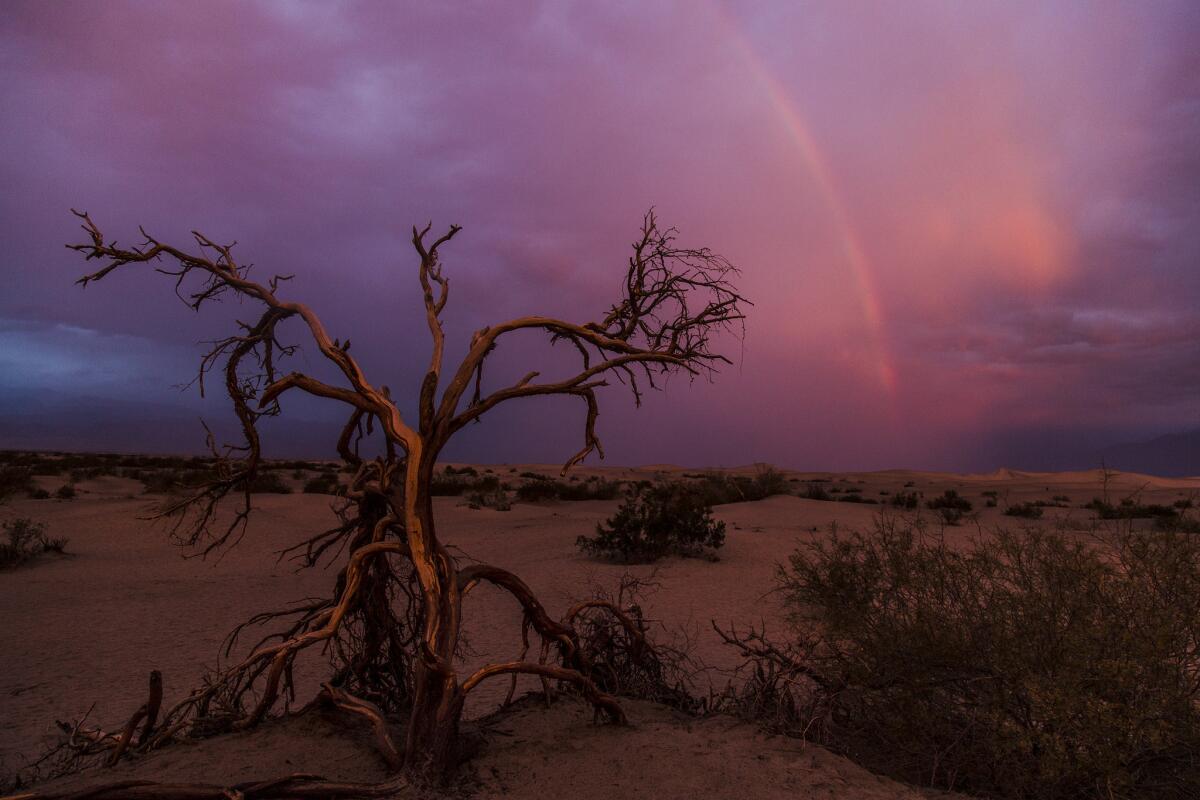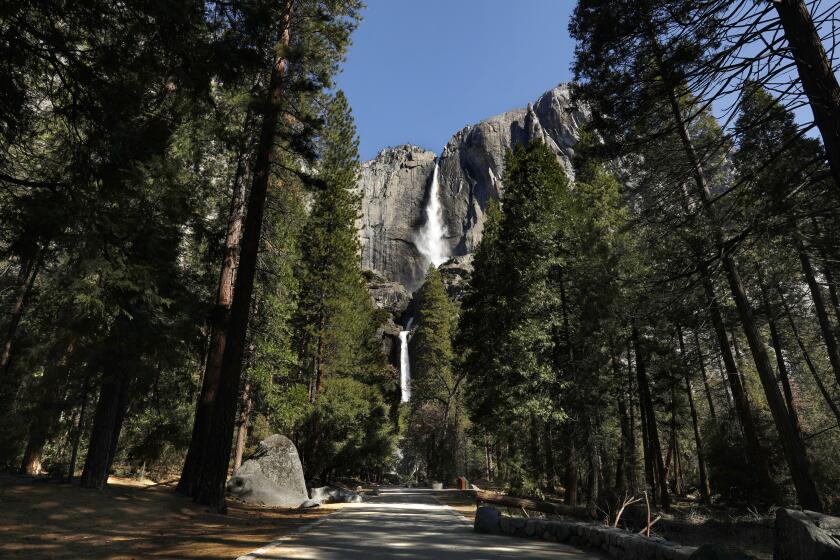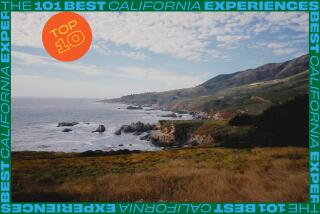As of June 25: All of California’s national parks are open. Kind of. We can explain.

- Share via
All of California’s 11 national parks and recreation areas are now at least partly open, and Death Valley on Friday reopened several campgrounds and resumed collecting entrance fees.
Several iconic sites still closed, however, include Alcatraz and Muir Woods in the Golden Gate National Recreation Area. Gov. Gavin Newsom continues to urge Californians to postpone leisure travel until the pandemic eases.
Here’s a park-by-park look. NPS officials say reopenings depend on progress in the fight to subduethe coronavirus, with decisions made in consultations with state and local leaders.
Channel Islands National Park. Open. This park never officially closed, but once concessionaire Island Packers stopped running daily boats, visitor traffic dried up. On June 1, Island Packers resumed running boats to the islands, but at reduced capacity to give passengers more room. The Santa Barbara Adventure Co. has also resumed kayak tours on Santa Cruz Island.
Get The Wild newsletter.
The essential weekly guide to enjoying the outdoors in Southern California. Insider tips on the best of our beaches, trails, parks, deserts, forests and mountains.
You may occasionally receive promotional content from the Los Angeles Times.
Death Valley National Park. The park has largely reopened — it was the last of the California national parks to do so — just in time for summer temperatures sometimes surpassing 110 degrees. On Friday, park officials announced the reopening of most park roads, trailheads, restrooms and overlooks, including the Badwater Road, Dante’s View, Artist Drive, Golden Canyon, and Ubehebe Crater. Also open: Furnace Creek, Emigrant, Mesquite Flat, Saline, Eureka, Homestake, Wildrose, Thorndike, and Mahogany campgrounds, along with the park’s rugged backcountry roads, including including roads to Saline Valley, the Racetrack, and Titus Canyon. Rangers are again collecting entrance and camping fees.
The Oasis at Death Valley, a privately owned complex of hotel rooms, restaurants and shops that serves as the park’s principal commercial hub, opened June 18. The Furnace Creek Visitor Center and Stovepipe Wells Ranger Station remain closed, though the bookshop at Furnace Creek is at least partially reopening. Because of the heat, rangers urge visitors not to hike at lower elevations after 10 a.m.
Golden Gate National Recreation Area. Gradually reopening. Still closed: Alcatraz Island, Muir Woods, the Golden Gate Bridge Welcome Center, the Point Bonita Lighthouse, all campgrounds and picnic sites, along with visitor centers at the Presidio and Lands End. Now open: Conzelman Road (famed for its view of the Golden Gate Bridge), parking at Stinson, Muir and Rodeo beaches, parking at Tennessee Valley, Fort Baker and Horseshoe Cove. Details are on the National Park Service website, or check the park’s advisory Twitter account @GGNRANPSAlerts. The recreation area’s Baker Beach and China Beach in San Francisco are open, as is parking at Fort Funston.
Joshua Tree National Park. Open. Most campgrounds are open, but its visitor centers remain closed. The park gets perilously hot in the summer.
Sequoia and Kings Canyon National Parks. Open. The roads, trails, restrooms and picnic areas of Kings Canyon and Sequoia are open. Campsite reservations will open 7 a.m. June 29 on recreation.gov for sites at Potwisha Campground and Lodgepole Campground in Sequoia and Sunset Campground in Kings Canyon.
Other campgrounds in the parks remain closed for now, and all previous 2020 camping reservations in the two parks have been canceled as part of pandemic closures and restrictions.
You’ll need a reservation to visit the park if you’re just going for the day
Lassen Volcanic National Park. Open. Hiking trails are reopened (except Bumpass Hell, which remains closed because of snow hazards) as well as the park’s 30-mile highway and Butte Lake and Warner Valley roads. Permitted back-country camping has resumed too. Walk-in campgrounds at Manzanita Lake and Southwest have opened. Seasonal campgrounds will open on previously scheduled dates; check Lassen’s website. The visitor center and museum remain closed.
Redwood National and State Parks. Partly open. Trailheads and parking lots have reopened, as well as restrooms, though guests are advised to bring soap and hand sanitizer. Visitor centers and campgrounds remain closed.
Pinnacles National Park. Partly open. The west entrance near Soledad is open from 8 a.m. to 8 p.m. The east entrance near Paicines is open but with limited parking. Visitors should arrive before 11 a.m. and after 3:30 p.m to get a spot. The campground on the east side remains open; visitor centers are still closed.
Santa Monica Mountains National Recreation Area. Mostly open. The area, which straddles Los Angeles and Ventura counties, has reopened most of its trails, parking lots, overlooks and restrooms. Its two visitor centers remain closed, as are some areas damaged by the Woolsey fire in 2018.
Yosemite National Park reopened lodgings, one campground and many popular trails, but will limit the number of visitors. Travelers who go for the day will need to pay entrance fees in advance and receive a vehicle pass on recreation.gov. The park also allows hikers with permits to summit Half Dome and enter the wilderness area, according to the park’s Facebook page. The cables that take visitors to the top of the landmark are in place. Also the Fish Camp area just outside the park’s southern entrance is open, along with the Tenaya Lodge, with more than 300 rooms.
More to Read
Sign up for The Wild
We’ll help you find the best places to hike, bike and run, as well as the perfect silent spots for meditation and yoga.
You may occasionally receive promotional content from the Los Angeles Times.








